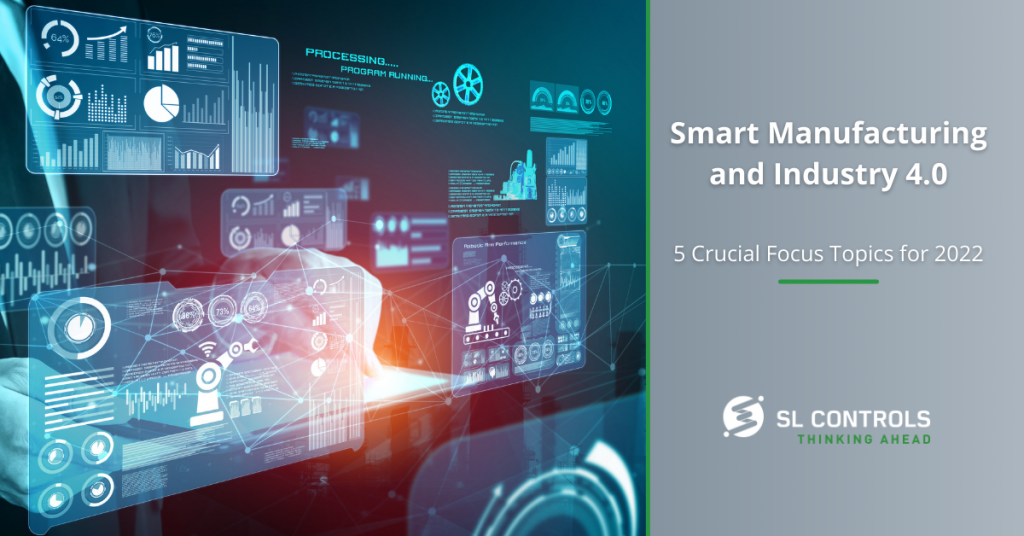At this time of year, it is common to see articles looking at the trends that will be important over the coming 12 months, particularly in relation to technologies. We even produce these articles ourselves at SL Controls. However, it is also important to look at smart manufacturing and Industry 4.0 more broadly to assess the challenges and opportunities that lie ahead as we move into 2022.
Here are five smart manufacturing and Industry 4.0 focus topics we believe will be part of national and global conversations in 2022 and beyond.
1. Talent
There is a lot we need to do as an industry in the area of talent to mitigate skills shortages and ensure Ireland stays at the forefront of the sector. One example is the importance of encouraging women and other under-represented groups into the industry, particularly in engineering disciplines.
The pace of change in the industry, driven largely by new and emerging technologies, is also an important consideration. Keeping up with these changes is essential at every level. This includes third-level education, where providers need to continue proactively adapting course content according to the new technologies that industry is using, as well as to the evolving needs of industry.
At a company level, there is also an essential requirement for upskilling existing staff and providing opportunities for continuous professional development. We also need to continuously highlight the importance of lifelong learning for those working in the sector.
2. Unlocking the Value of Data
Data is the crucial component to achieving the smart factory of the future. There are challenges to overcome, however, including the fact that most facilities have legacy systems that are not connected or integrated.
There is a continuing need across the industry to build solutions that make it possible for both legacy systems and new systems to deliver usable data. This requires increased use of sensor technology, system integration solutions, and big data.
It is also worth mentioning data fabric, the data architecture that integrates and simplifies data management. It is an emerging technology, but it is one that will grow in importance.
3. Supply Chain Resilience
Supply chain disruption has been a common feature for manufacturers in various industries over the past 12-24 months, including in the industries that we operate in at SL Controls – pharmaceuticals, medical devices, and technologies.
The varying causes of supply chain disruption include high demand, increased raw material costs, slow delivery times for raw materials, and rising freight costs. However, the end results are the same – increased costs and production disruption.
Smart manufacturing technologies can provide a large part of the solution. This includes creating digital supply chains by integrating data at all points.
Digital supply chain solutions improve and automate planning, and they enhance visibility. This gives manufacturers the tools they need to predict and respond to challenges in the supply chain and, ultimately, minimize disruption.
4. Implementing Ireland’s Industry 4.0 Strategy 2020-2025
The Government published Ireland’s Industry 4.0 Strategy 2020-2025 in 2019. The coming year will see us cross the halfway point of the strategy, making it an ideal time to reflect on progress and redouble our efforts to ensure the objectives of the strategy are achieved.
Taking account of multiple viewpoints is important, too, particularly given the global nature of Ireland’s manufacturing industry. Not only do we make products here in Ireland that are sold internationally, but some of the world’s largest companies have manufacturing operations on these shores.
This includes US companies, and we got an insight into their collective thinking in a position paper published this year by the American Chamber of Commerce Ireland. That position paper welcomed the publication of Ireland’s Industry 4.0 strategy, but it also set out four recommendations. Those recommendations cover Ireland’s efforts to become a global leader, in addition to talent, funding, and governance.
5. Focus on Sustainability
There is an increased focus on the sustainable managing of operations across all sectors, including the manufacturing sector. This is being driven by regulations as governments across the world develop and implement strategies to meet environmental targets. However, regulations are not the only factor, as consumer expectations on sustainability are driving change too.
Therefore, it is now increasingly important to take into account sustainability issues when implementing smart manufacturing and Industry 4.0 solutions, as well as when developing business cases, strategies, and roadmaps.
The Role of Smart Manufacturing and Industry 4.0
Manufacturers and the wider manufacturing industry face uncertainties as we head into 2022, not least because of the ongoing global Covid-19 pandemic. However, the past 18 months have also taught us a lot about resilience, innovation, and the ability of the sector to push forward despite the challenges.
There are massive opportunities available to the sector, too, from attracting new talent to doing more with data to contributing to the creation of a more sustainable world. Smart manufacturing and Industry 4.0 solutions and initiatives will play an important role in these areas and many more.

